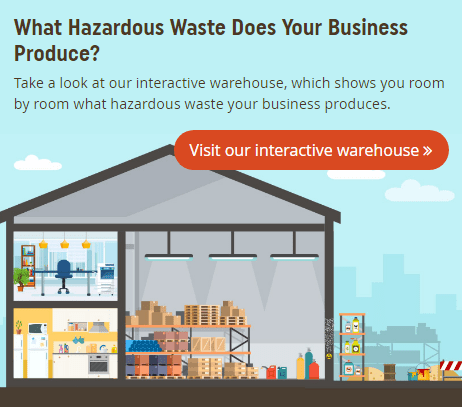
What Hazardous Waste Does Your Business Produce?
The commercial workplace is no stranger to hazardous waste. The only reason you may not have noticed which items are hazardous in your commercial premises before is because they’re such a common sight.
Whether they’re harmful for humans or the environment, there is a reason this waste type needs to be handled carefully and disposed of in an even more careful manner. In this article, we’ll tour around the different portions of a commercial premises and list off the items you need to give greater consideration to when it comes to disposal.
Office
Just your everyday office space, you might think, but there are still a number of hazardous materials which require special care once you want to throw them out. There are some obvious culprits here, but some you may not have thought about before.
Start with the most obvious: ink cartridges from the printer. Almost every office will have a printer, some of them quite large, which means there are residual ink chemicals. How about batteries? A recycling scheme for these might be the best bet, since you definitely can’t throw them in the normal waste bin.
Finally, electronics. Whether it’s a computer monitor or a desk fan, these items count as WEEE and should be disposed of separately to normal waste in order to safeguard the environment against various components.
Warehouse
Warehouses see regular use by people coming and going, so knowing where the hazards are is key. This applies to waste in these areas too, of which, petrol and flammable liquids are probably the most common.
Proper consideration should be given for where these items are disposed of, including gas cylinders, which can be recycled, and fluorescent lights. The later of these items could contain mercury, which is why they should be handled and disposed of with care.
Construction site
Whatever it is you’re building, a construction site will have all sorts of waste which needs to be separated and disposed of. There are numerous hazardous wastes to consider, including asbestos containing materials, which can be a serious and fatal health hazard for humans.
Other materials you might want to keep an eye out for include paints and oils, as well as pesticides if your construction site involves any landscaping or garden cultivation. These can all be bad for both humans and the general environment if not taken care of properly.
Kitchen
Many buildings will contain some kind of kitchen, which usually means there will be an number of electronic appliances you can’t get rid of. Refrigerators contain dangerous gases, making it doubly important to take care when disposing of one.
Since plenty of cooking will be done – especially in a kitchen with industrial capacities – the use of cooking oil will be more prominent. This can be a huge fire hazard if it is not disposed of in accordance with the law. Similarly, bleach is a cleaning material which will no doubt be present in a kitchen if you’re a clean bunch, but make sure you use the right waste channel when disposing of any harmful chemicals such as this.
For another look across your commercial premises, and to help you spot where the hazardous waste might be on your site, take a look at the interactive graphic representation from Brown Recycling – the experts in managing hazardous waste.
This website uses cookies to enhance your browsing experience and deliver personalised ads. By clicking “Accept All Cookies”, you agree to the storing of cookies on your device to enhance site navigation, analyse site usage, and assist in our marketing efforts.




